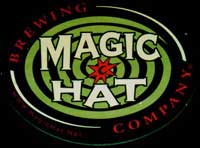Magic Hat Expansion information

Magic Hat’s craft-beer wave
By Lauren Ober, Free Press Staff Writer
It’s no revelation that this country loves its beer. Whether it’s Schlitz or Switchback, Americans are attached to their suds.
In 2007, Americans consumed 71 billion bottles of beer. Not only does that mean a lot of trips to the bathroom, it also means the beer industry raked in a hefty chunk of the domestic beverage bounty; about $97 billion, according to the Brewers Association, a craft brewing trade group.
Within the United States beer market, craft breweries — independent companies that produce fewer than 2 million barrels a year — are exploding in popularity. In 2007, the craft-brewing segment grew 12 percent. Of 1,449 breweries operating in the U.S., 1,406 are craft breweries, according to the trade group.
South Burlington’s Magic Hat Brewery knows a little something about that sort of growth. Since it started turning water, barley, hops and yeast into beer in 1994, Magic Hat has outgrown two facilities. The company is currently in the middle of a sizable expansion of its brewery on Bartlett Bay Road that Magic Hat CEO Martin Kelly says will help the brewery maintain its 20 percent to 30 per´cent annual growth.
Magic Hat has always billed itself as the quirky stepchild of traditional microbrews such as Sierra Nevada, Anchor Steam and Boulder Beer. When the company was started, many of those companies were creating similar products, says Magic Hat co-founder Alan Newman, and he wanted his beer to stand out.
“When we got involved, we said, ‘Let’s do it differently,’†Newman said. “Our strategy has always been to go to a space no one was occupying and put our own personality into it.â€
That personality is a sort of ode to New Orleans voodoo and pageantry with all the attendant peculiar mystical charm. Why else would a the company launch a wildly successful Mardi Gras celebration in Burlington, hundreds of miles from the French Quarter?
The company has staked its business on its irreverence and it has paid off. The company’s memorable names for its brews — such as Lucky Kat, Circus Boy and the retired Heart of Darkness — also attract attention and help build brand loyalty.
Bubbling business
In 2000, the company brewed 26,177 barrels of beer. Seven years later, Magic Hat the company produced 107,000 barrels, doing $20 million of business in the process.
That growth hasn’t changed the way the company does business, Kelly said.
“The company has grown substantially over the years, but we still adhere to the principle of being distinctive,†Kelly said. “We still look for ways of being theatrical and irreverent while still making great beers.â€
The current expansion will allow the brewery to make 300,000 barrels of beer a year, twice what facility has the capacity it has for now. The new 7,000-square-foot building will house a new bottling machine capable of filling 400 bottles a minute, up from 100 bottles a minute on the current machine. A new 150-barrel brew house will replace the 50-barrel brew house; and new fermenting and conditioning tanks, as well as expanded refrigeration and storage space, will allow the company to grow steadily.
The Artifactory, which holds all the Magic Hat merchandise along with a tasting bar, also will get a substantial face lift. Over the years, Magic Hat has moved beyond the realm of a traditional microbrewery and has become what the Brewers Association, a craft brewing trade group, calls a regional craft brewery. There are 54 regional craft breweries in the U.S., including Dogfish Head in Delaware, Shipyard in Maine and Long Trail and Otter Creek in Vermont.
The company’s ascension to the broader market apparently hasn’t done anything to damage its street credibility as a Vermont microbrewery. Willie Docto, executive director of the Vermont Brewers Association, which represents the 18 microbreweries and brew pubs in the state, sees Magic Hat’s growth as a harbinger of good things to come for the beer industry in the state.
“They have a very distinctive image and profile, which can help them acquire a bigger market. It’s wonderful that they’re growing,†Docto said.
People who know beer know Magic Hat comes from Vermont; and that recognition has helped draw attention to microbrews around the state and add to their cachet. Over the years, the Vermont craft beer industry has enjoyed substantial growth and now the state has the highest number of brewers per capita of any state in the country, Docto said.
Magic Hat’s development has been “slow and methodical,†Kelly said, and now its beer is available in 18 states. Despite the company’s success and its $6.5 million expansion project, Newman says Magic Hat is much the same as it always was.
“At the end of the day, we really haven’t changed much,†Newman said.
 April 30th, 2008
April 30th, 2008